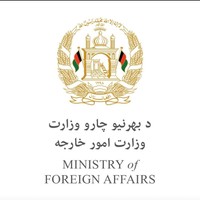The Afghan Ministry of Foreign Affairs (MoFA) rebutted the Pakistani government’s claims that Tehrik-e-Taliban Pakistan (TTP) is operating in Afghanistan with support from India.
In their detailed statement, MoFA said they welcomed the UN Analytical Support and Sanctions Monitoring Team’s report on Taliban and were responding to remarks made by Pakistan’s Foreign Office on Thursday that said the report had been misrepresented by India to slander Pakistan.
The Pakistani statements said that it had “warned the world about the role of spoilers within and outside Afghanistan” who have been using Afghan soil to sponsor terrorist organisations against Pakistan.
Pakistan then pointed to the TTP segment of the UN report and noted, “The MT report [UN report] endorses Pakistan’s stance that Tehrik-e-Taliban Pakistan (TTP) is operating from Afghanistan and with Indian support threatens Pakistan and other countries in the region.”
The Afghanistan government rejected these allegations that a “third party” was using Afghan territory to support the TTP and “destabilize Pakistan.”
They said, “TTP and its splinter groups have the blood of the Afghan people on their hands” and pointed that they are designated as terrorist organisations in the National Threat Assessment and National Security Policy of Afghanistan.
“Like other terrorist organizations, TTP has allied itself since its emergence with those fighting the government and people of Afghanistan,” they mentioned in their first point.
Over the past years, a significant number of TTP leaders and operatives have been either killed or have been captured by the security forces in Afghanistan.
MoFA also underscored how Afghans have been victims of terrorism and had striven to pull their weight in the region’s collective fight against violence.
They have eliminated a number of top TTP leaders and prosecuted or imprisoned hundreds of foreign fighters from transnational terrorist organisations, said the ministry. They named groups such as TTP, Lashkar-e-Taiba (LeT), Jaish-e-Mohammed (JeM), Turkistan Islamic Movement (ETIM), Islamic Movement of Uzbekistan (IMU), and Islamic State-Khorasan Province (IS-K), who had been recorded.
This is a “testament to our strong will and relentless efforts without any distinction in the fight against terrorism,” it mentioned.
“Furthermore, in the interest of transparency and regional cooperation, we have provided access for concerned partner countries to the leaders and operatives of terrorism outfits in our custody.
“As a cornerstone of our commitment in the fight against terrorism, we have shown it transparently that Afghanistan has never allowed and will never tolerate any acts by any third party, whether state or non-state, to use Afghanistan to destabilize another country.”
The ministry also commented on Pakistan’s comments on how India is distorting and falsifying the contents of the report with “concocted allegations reveal that India’s agenda is to create complications for the Afghan peace process.”
The ministry reminded Pakistan that the peace process is fragile and ongoing and they “need determined and far-sighted cooperation of all our regional and international partners.”
“We believe it is in the best interest of countries in the region and the international community to support the Afghan peace process as it will bring strategic gains to the international counter-terrorism and regional security efforts.
“A lasting intra-Afghan peace will deny all foreign fighters and terrorist organizations any symbiotic relation they have established with those who fight against Afghan government and people and with those trans-national criminal organizations that are involved in drugs, weapons and human trafficking.”
They concluded with the line: “Therefore, it is our earnest expectation that partner countries in the region and beyond will support the Afghan peace process as a key investment in regional and global counter-terrorism and stability.”
On its part, India also commented on Pakistan’s statements and reminded them that Pakistani Prime Minister Imran Khan had delivered a speech at the U.S. Institute of Peace in July 2020 where he had said Pakistan still has “about 30,000 to 40,000 armed people who have been trained and fought in some part of Afghanistan or Kashmir.”













